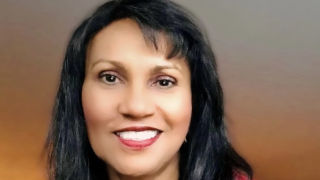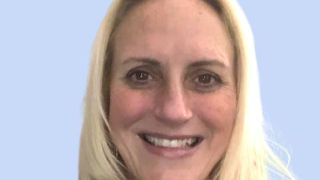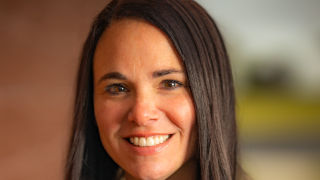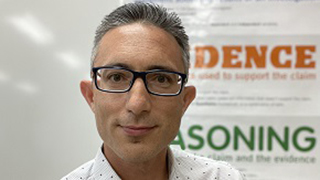Critical Conversations with New Jersey Teachers of the Year
Wednesday, March 16th, 2022
The Governor's Educator of the Year Program annually recognizes outstanding educators by district, county, and state. The national program honors educators for their dedication to their students and the profession. A panel of educators selects the New Jersey Teacher of the Year based on written applications, video submissions, and interviews from a competitive pool of teachers. Those chosen represent exemplary, innovative, and prominent instructors and educators within the education community.
The College of Education and Human Services (CEHS), Kappa Delta Pi (KDP) International Honor Society in Education, and the NJ Pre-Service Education Association (NJSEA) at Seton Hall are proud to have hosted a panel discussion featuring four 2021-2022 NJ County Teachers of the Year and NJ State Teacher of the Year.
Moderated by Associate Dean Omayra Arocho, this distinguished panel of educators shared their philosophy on teaching and assessment as well as personal, academic, and professional experiences that shaped their teaching style. Additionally, each panelist talked about their approach to modeling an inclusive classroom and curriculum while integrating their students' various cultures, backgrounds, and experiences.

Theresa Maughan teaches social studies in the Stem Academy in East Orange, NJ.
The distinguished panelists included: Theresa Maughan, 2021-2022 NJ State Teacher of the Year, Social Studies, East Orange STEM Academy (Essex County); Dennis Dagounis, Science, Roselle Park High School, Roselle Park (Union County); Kimberley Madalena, Language Arts, Washington Middle School, Harrison (Hudson County); and Michelle Poolaw, Elementary Mathematics, Hillside Elementary School, Mount Laurel Township (Burlington County).
Theresa Maughan began the discussion by delivering a powerful narrative related to her journey as a student and how that informed and influenced her professional experiences. She spoke about the continual journey of being a student and referenced the constant need to learn, adapt, and adjust approaches and interactions to meet best meet her students' needs. Maughan discussed embodying and representing being a lifelong learner. In her message, she emphasized the value of zealously embracing the journey of education and knowledge and the importance of interactions and relationships. She said, "That's a mission of mine; to help students want to become lifelong learners themselves."
Maughan talked about how her passion and approaches to teaching come from her personal experiences growing up. "I chose to become a teacher because my personal story is an immigrant story," she explained. "My dad came here as a printer on a work visa, and when I was in 6th grade, the reality set in that my dad's visa was not being renewed. So technically, we were undocumented aliens, and my father needed help."
Her family turned to Maughan's school for help. "My social studies teacher, Mrs. Roman, stepped up. She immediately launched this campaign within the school with our student body to get letters written to send to a congressman." Maughan planned to take her personal experiences and manifest them into a career as a lawyer. However, while pursuing her law degree, she noticed something was missing. She reconnected to what felt significant to her, and realized her passion was teaching. Her mission has been to help her students by integrating the nuances of real-life experiences into the classroom setting, making education applicable to her students' personal lives.
Each panelist described a similar approach to teaching: tapping into not only mind of their students but their hearts and souls as well. As panelist Kim Madelna, shared, there is a genuine desire for their students "to question each other and to dig deeper."
Each of the panelists described how personal experiences drove their passion as educators and how they leveraged their understating to form trusting relationships with their students. Conversely, each panelist discussed the challenges of COVID-19 and how they adjusted and adapted in order to maintain relationships with their students. The context of this portion of the conversation portrayed a central animating spirit of choice.

Kimberley Madalena teaches Language Arts in Washington Middle School in Harrison, NJ.
Giving Students a Voice
"COVID was a challenge," Theresa Maughan said. However, the panelists talked about
creating ways for students to hold onto and express their voice and making that a
central priority. Theresa Maughan and Kim Madalena both spoke about how creating space
for students to express their voice helped build relationships and ultimately led
to engagement and trust. "It's very important, in terms of engagement in my classroom,
that students have choices. I believe that when they feel that they are not just sitting
there but are part of the learning experience, they have a say in what is happening.
They are willing to give so much more of themselves to the environment," Kim Madalena
said. "I feel that my students not only understand the content of what we're doing
but applying real-world critical thinking skills."
Dennis Dagounis talked about applying knowledge through creative and critical demonstrations, rather than assessing students through multiple-choice tests: "As long as the kids can demonstrate the concepts and apply the knowledge, that's really the big key. I can access their knowledge that way.”
Assessment Beyond Testing
Echoing the themes of choice, connection, and engagement, Dagounis noted that engaging
with students through concepts in their social environment allows them to bridge educational
material with real-life applicability in creative and personal ways. For example,
his students completed a project based on the Marvel Comic world. "Right now they're
working on their creating the forbidden lands of Pandora, and they're incorporating
all the animals into the forbidden land. They're creating animals and the environment.
Then they're going to apply the concepts of ecology and evolution. Based off of their
application, I'm going to assess their knowledge."
Dagounis' account strongly reflected a central notion among the panelists. Namely, that assessing a student's knowledge can be done outside of tests. "There's more of a foundational push for conceptual understanding," Michelle Poolaw said. "This means being able to manipulate and understand what is happening instead of just memorization and procedures and formulas. We have kids talk about their thinking and how they solved problems."
The discussion concluded with a discussion about fostering an inclusive classroom setting and recognizing diversity in their students' cultures, backgrounds, and experiences. Theresa Maughan noted diversity in learning styles. "You want to address the means by which they learn the best," she said.

Michelle Poolaw teaches math at Hillside Elementary School in Mount Laurel Township, NJ.
"Getting to know who is in your classroom will allow you to find resources that create a more inclusive curriculum." Maughan added, "We also want to utilize their cultural strengths." Michelle Poolaw expanded upon the sentiment of inclusion and honing in on each student's cultural strengths. Poolaw talked about representing a standard of inclusion through her actions and setting a precedent for her students to follow.
She does this by holding each students' ideas and values equally, nothing the importance of educators reflecting authenticity to their students and empowering them to do the same for others: “No matter what it is that you're doing," Poolaw said, " you have to come through with your heart and be authentic.
Kim Madalena added, "They [students] are the future. As teachers, we are responsible for helping them develop the best future possible." Referencing Lois Lowry's book, The Giver, and the honor of an educator to influence and facilitate change for students, which means influencing change for a more inclusive future.
Q & A
The program concluded with the panelists fielding questions from students and faculty.
The education students' questions echoed a similar sentiment heard throughout each
panelists account—a desire to provide their students with hope and opportunity. Students
and panelists discussed essential topics related to inclusion, professional burnout,
time management, and reinventing personal self to help stimulate professional growth.

Dennis Dagounis is a science teacher at Roselle Park High School.
In response to each student's questions, the panelist's answers continued to demonstrate a passion for education. Dennis Dagounis’s and Kim Madalena's response to a student's questions appeared to bring together the central theme of the entire discussion.
Dagounis said: "I'm passionate about my job because I reinvented myself and changed what I was doing. So don't be afraid to make those changes." Madelena added, "I think many of us get into this profession because we want to save the world, and sometimes, we need help, and it's important to lean on people that can help you." Thus, passion and change intersect when educators learn from their students, as much as their students learn from them.
The distinguished panelists provided education students with real-life experiences and applications for the classroom. Doctoral student in Education Leadership, Management and Policy at Seton Hall, Yolanda Jackson shared, "The panelists offered a wealth of information about their experiences as Teacher Leaders. Their teaching philosophies were innovative and rooted in social-emotional learning. They remained even more committed to education through a global pandemic. Listening to their passion and dedication for education was truly inspirational."
Categories: Education






